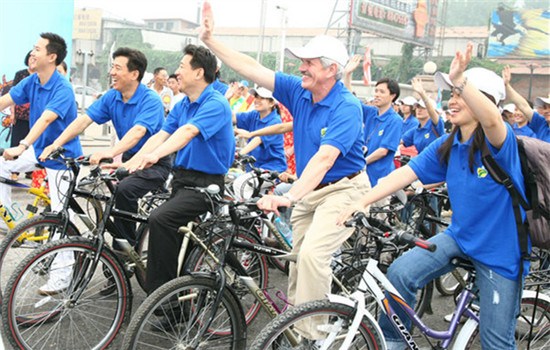
A Beijing event to promote green transport in 2008. (Photo provided to China Daily)
In 1985, Dudek had the opportunity to join the EDF, which was looking for someone to work on economic incentives to control atmospheric pollution.
"I thought this was the chance to take the ideas in the textbook and put them into reality," he says.
Since then, he has been working to put the concept of "cap and trade" into practice. This approach limits the overall amount of pollution produced by factories while allowing the emitters to save or trade their excess quotas of emission to those unable to meet the required standard. The result: Both groups are motivated by profits to reduce their pollution impact.
Dudek's work contributed to the Clean Air Act Amendments of 1990, under which the first emission-trading program in the U.S., was set up. Dudek and his team were praised by President George H.W. Bush for breaking the logjam on acid rain.
A decade later in China, the EDF helped to set up the nation's first sulfur-dioxide trading program in Nantong, Jiangsu province, after which the government decided to expand the pilot program to four provinces, three cities and one company, marking the country's first venture into the "cap and trade" concept.
In 2004, Dudek received the Friendship Award, the highest honor given by the Chinese government to foreigners for their contributions to the country.
"I was delighted, because this meant that environment was becoming a real priority for the (Chinese) government," says Dudek.
"Introducing foreign experts is all about introducing the new ideas, so we can learn from some of the expensive lessons that other countries have gone through," says Dudek. "It's like the old Chinese saying: If you want to know what lies ahead, ask someone coming back."
Dudek has been to China around 200 times, visiting every province for various environmental projects.
During the Shanghai Expo 2010, his team introduced a number of subway tickets carrying 20-yuan-worth of carbon credits sold by farmers, who had changed their farming methods with the help of EDF to reduce the use of fuels.
"It's a way to help spread the idea of emissions trading to ordinary people," says Dudek.
He has met with three premiers-Li Peng, Wen Jiabao and Li Keqiang, sharing his view that "there doesn't have to be a trade-off between environment and economic development". With smart policies, Dudek said then and now, you can have more economic development and more environmental protection.
Dudek is delighted that China is going to launch a national emission-trading system of carbon dioxide in 2017.
"My sense is that Chinese people have been always interested in new ideas. The real challenge for us is to bridge the idea and the reality in China, to make it practical."


















































